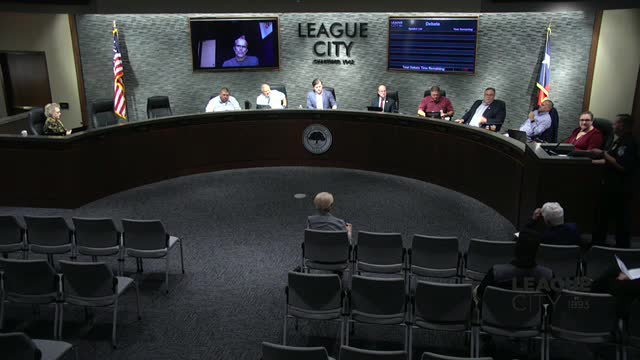League City staff present proposed ordinance to address derelict boats, liveaboards and marina safety
Get AI-powered insights, summaries, and transcripts
Subscribe
Summary
League City staff described a draft ordinance to set seaworthiness standards, require liveaboard permits, and create an abandoned/derelict vessel removal process; no vote was taken and staff will revise the draft after Council feedback.
League City staff on Oct. 28 presented a draft ordinance that would set seaworthiness standards for vessels, require liveaboard permits at marinas, and create a city-managed process for removing abandoned and derelict boats from Clear Lake and other League City waterways.
The draft would define a liveaboard as "a boat that is being utilized as a home for more than 10 days consecutively in a 30 day period," require liveaboards to obtain permits, and cap liveaboard occupancy within a marina at 15 percent of total slips, staff said. It would also declare derelict vessels a public nuisance and create notice, appeal and emergency-removal procedures.
Why it matters: Council members and staff said the draft is intended to reduce health, safety and navigation hazards and to lower long-term removal costs for vessels that sink or deteriorate. Staff and council members cited recent criminal incidents on marinas, the costs of salvage, and regional coordination needs with other cities and counties that share Clear Lake.
Key provisions and procedures - Seaworthiness standard: The ordinance would require vessels in League City waterways to be "seaworthy," a condition staff described as absence of significant structural damage, hull breaches, uncontrolled flooding, major electrical hazards or a lack of required propulsion/navigation capability. The draft includes consideration of continuous bilge-pump use as a factor but not an automatic disqualifier.
- Liveaboard permitting: Liveaboards would need a city permit, proof of insurance, ownership authorization, contact information, a Coast Guard or U.S. Coast Guard Auxiliary safety inspection, sanitary-system information, written consent to inspection and, in specified cases, a background check. Staff said the permit would be monitored by marinas and that a fee schedule would be proposed when the ordinance returns for formal consideration. The draft limits liveaboards to 15% of a marina's slips; staff said one local marina indicated that limit was acceptable.
- Abandoned vessels: The draft treats an "abandoned vessel" similarly to a junk-vehicle standard: inoperable, roughly older than five years, left unattended in public waters or aground for at least 48 hours. Staff described a tagging process, a 20-day notice period to the last-registered owner and options to transfer vessels to partners such as the General Land Office (GLO) or Galveston County, or to send them to auction.
- Derelict vessels and abatement: A derelict vessel would be a self-propelled watercraft that is dismantled or discarded and has remained in that condition for more than 72 hours. The draft would enable the city to declare such vessels a public nuisance, require notice to last users and recorded lienholders, and allow owners to appeal to municipal court. Staff said emergency removal would be authorized when a vessel presents an imminent navigation, health or environmental hazard (for example, sinking in a channel or leaking fuel).
Costs and enforcement Staff quoted local tow-company estimates for removal: roughly $250 per foot for boats that are still floating and $500 or more per foot for vessels that have sunk. Staff emphasized that intervening earlier is generally less expensive.
Partnerships and regional coordination Staff said the City has discussed the draft with the Texas General Land Office (GLO), Galveston County and neighboring cities around Clear Lake. Council and staff noted Harris County Precinct 2 has set aside funding to help remove boats from docks if cities can get vessels to collection points; one council member said he had committed to lead development of a uniform ordinance among the lake cities.
Council questions and staff responses Council members asked about definitions and scope (for example, whether private residential docks and slips outside formal marinas would be covered), permit duration and fees, a background-check standard and how the city would distinguish hobbyist boat restorers from derelict-vessel cases. Staff said the draft already contemplates application across "any waterway" of the city and that they would revisit definitions (including propulsion requirements and explicit language on sailboats and non-motorized craft). Staff said permit fees were not yet set and would be proposed later, and that the city would likely rely on Coast Guard partners for safety-inspection expertise while enforcement staff gain experience.
Process and next steps No ordinance vote occurred. Staff asked the council for feedback and said they would revise the draft and return it for consideration at a future meeting. Council members encouraged staff to clarify the marina definition, address private docks (several council members suggested a ban on liveaboards at private docks), explore decals or registration stickers for permitted liveaboards, and continue coordination with regional partners.
Attribution and public comment Representatives from the General Land Office attended the discussion; Garrett Fosick (Neighborhood Services), Kurt Adams (GLO) and Joey Breres (GLO) were introduced by staff. Several council members and staff recounted prior storms and criminal incidents as background for the proposal. No members of the public spoke during the public-comment period for this item and no formal motions or votes were taken during the Oct. 28 work session.
Ending: Staff asked council members to send written feedback and said the ordinance would be revised and brought back for formal consideration in coming meetings.
